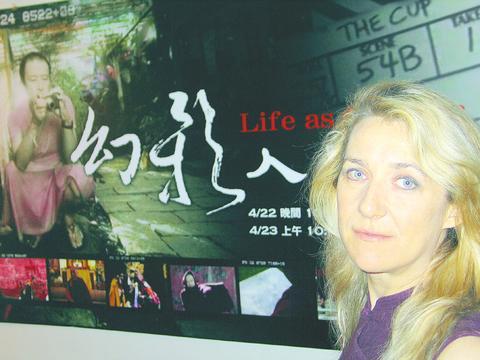Life as Cinema by Anika Tokarchuk is a 56-minute documentary about the making of The Cup (1999) (高山上的足球盃), the debut feature film of Dzongsar Khyentse Rinpoche (aka Khyentse Norbu).
Dzongsar Khyentse Rinpoche, a spiritual director of several Buddhist colleges in India, Bhutan and Sikkim, is recognized in his culture as the third incarnation of the Khyentse lineage of Tibetan Buddhism. Life as Cinema voices his Buddhist reflections on the impermanence of life.

PHOTO: BEN ZULLO
The film begins with Dzongsar Khyentse Rinpoche making a shadow butterfly on the wall with his hands. While the butterfly's magnified shadow flaps its dark wings on a white wall, he asks, "How do you know this is a butterfly?"
The shadow on the wall is like reality projected on the screen of our mind. The layers of illusion and reality are interwoven into each other. While the theme of illusion is dominant in the film, the encounter between modernity and tradition in everyday Tibetan culture is also telescoped into Dzongsar Khyentse Rinpoche's character.
Educated in London and given his first movie-related job by Bernardo Bertolucci in Little Buddha, Dzongsar Khyentse Rinpoch rides the tide of westernization and redefines his role as a Rinpoche.
When Tokarchuk informs the Dalai Lama that Dzongsar Khyentse Rinpoche is making a feature film based on the real events of the monks at Dzongsar Institute, he breaks into laughter commenting, "Oh, I see, lamas are actors now."
As she reveals in her documentary, the actors in The Cup are all from a real monastery and cast by their ecclesiastical superior. (Dzongsar Khyentse Rinpoche coaxed 14-year-old Jamyang Lodro into playing the role of Orgyen in The Cup with a promise of taking him to Disneyland.)
Jovial and with a sense of absurdity, Life as Cinema rings quiet notes of political urgency. Unlike other dramas on Tibet such as Kundun (1997) and Seven Years in Tibet (1997), Tokarchuk does not portray Tibet as mired in Chinese suppression. Instead, Life as Cinema tracks the footsteps of Tibetan Buddhists to India, France, England, Canada, Hong Kong, and of course Taiwan.
It is, after all, a documentary on Tibet-on-the-move, a film on the nature of change and openness.
The second part of the trilogy will go into the background of Dzongsar monastery in Tibet and focus on Karpu Lama, a Tibetan who now lives in Taiwan.
In a partial preview, Karpu's exile from Tibet is captured in a soliloquy that drifts across beautifully crafted images of Tibetan valleys and Taipei's streets. "Life is dreamlike," says Tokarchuk, "but it is also telling a history."
For your information :
There will be a free public screening of Life as Cinema at the Wisteria Tea House (

The primaries for this year’s nine-in-one local elections in November began early in this election cycle, starting last autumn. The local press has been full of tales of intrigue, betrayal, infighting and drama going back to the summer of 2024. This is not widely covered in the English-language press, and the nine-in-one elections are not well understood. The nine-in-one elections refer to the nine levels of local governments that go to the ballot, from the neighborhood and village borough chief level on up to the city mayor and county commissioner level. The main focus is on the 22 special municipality

In the 2010s, the Communist Party of China (CCP) began cracking down on Christian churches. Media reports said at the time that various versions of Protestant Christianity were likely the fastest growing religions in the People’s Republic of China (PRC). The crackdown was part of a campaign that in turn was part of a larger movement to bring religion under party control. For the Protestant churches, “the government’s aim has been to force all churches into the state-controlled organization,” according to a 2023 article in Christianity Today. That piece was centered on Wang Yi (王怡), the fiery, charismatic pastor of the

Hsu Pu-liao (許不了) never lived to see the premiere of his most successful film, The Clown and the Swan (小丑與天鵝, 1985). The movie, which starred Hsu, the “Taiwanese Charlie Chaplin,” outgrossed Jackie Chan’s Heart of Dragon (龍的心), earning NT$9.2 million at the local box office. Forty years after its premiere, the film has become the Taiwan Film and Audiovisual Institute’s (TFAI) 100th restoration. “It is the only one of Hsu’s films whose original negative survived,” says director Kevin Chu (朱延平), one of Taiwan’s most commercially successful

Jan. 12 to Jan. 18 At the start of an Indigenous heritage tour of Beitou District (北投) in Taipei, I was handed a sheet of paper titled Ritual Song for the Various Peoples of Tamsui (淡水各社祭祀歌). The lyrics were in Chinese with no literal meaning, accompanied by romanized pronunciation that sounded closer to Hoklo (commonly known as Taiwanese) than any Indigenous language. The translation explained that the song offered food and drink to one’s ancestors and wished for a bountiful harvest and deer hunting season. The program moved through sites related to the Ketagalan, a collective term for the